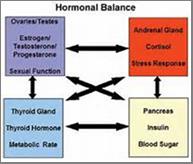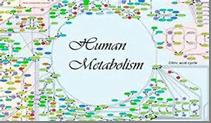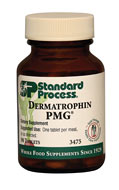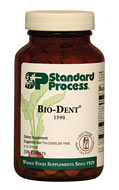Skin Problems and Your Hormones

Hormones play a critical role in oil production in the skin. Some hormones – particularly the male sex hormones like testosterone cause more oil production and some hormones like estrogen cause less. And an imbalance will in every single case make cystic acne bigger, more permanent, and more painful. According to scientific research there are these hormones that cause cystic acne: Insulin, Testosterone, DHEA, Cortisol, Estrogen, Progesterone and Thyroid Hormone.
If you have health issues, you have endocrine issues. The body has two main coordination systems. Coordination just means getting things aligned and working together. The first is the nervous system and the second is the endocrine system. The nervous system carries information fast, at roughly 280 mph. Think of it as a network of telephone wires that enable a blanket of communications throughout a wide area.
The endocrine system isn’t as fast as the nervous system. Think of it as the postal system. It carries chemical messages, which have to be made and carried through the bloodstream. Even though this system is much slower, the information that it carries is very important. The hormonal system as a whole is called the endocrine system. A hormone is a chemical message produced by a gland in the body and sent through the bloodstream to another area where it causes some effect. For example, exercising can create fat-burning effects that last for 48 hours after the workout.
There are over 600 different hormones in the body, each with a unique function. Fat burning, fat storing, appetite, sleep, hair and fingernail growth, fluid levels and joint repair are just a few examples of direct effects that hormones have on the body.
Hormones tell the body what to do, causing millions of effects each day for instance, they tell the heart how fast to pump and the bones how quickly to grow. Each gland has its own purpose in regulating certain areas of the body.
The endocrine system’s main purpose is to maintain homeostasis, or internal stability. It maintains internal functions by increasing (stimulating) or decreasing (inhibiting) things like temperature, blood pressure, blood sugar, inflammation, growth, hair, cholesterol, wakefulness, and sleep. Hormones are involved in coordinating and integrating the body, mind, emotions.

There is a strong interdependence between all of hormones. When one hormone is released, it affects many other hormones. This works by extensive feedback loops. For instance, if there is too much hormone secreted by a gland, it feeds back a message to another gland to slow its secretion and that can create a domino effect throughout the body's entire hormone balance and health overall. It is a system that cannot be micromanaged, yet everyone seems to be trying to do exactly that. Hormones are connected by areas of the brain known as the hypothalamus and the pituitary. Both help control feedback messaging loops within the endocrine system, receiving and relaying information about whether to increase or decrease hormonal output by the thyroid, adrenals, ovaries, pancreas and other tissues.
- Pituitary gland to run the show and Hypothalamus gland to coordinate the endocrine system with the nervous system
- Thyroid gland for metabolism
- Pancreas to metabolize sugar
- Adrenal glands for energy and coping with stress
- Sex glands for reproduction
- Pineal gland to keep our biological clock vibrating
Huge factor that needs to be considered is the loss of communication between the hypothalamus and pituitary gland and sex hormones, pancreas, adrenals and thyroid. There is central regulation and peripheral regulation of sex hormones, adrenals, thyroid hormone and insulin. Central regulation occurs in the pituitary and the peripheral regulation occurs once the hormone has left the ovaries, adrenals, thyroid and pancreas gland itself. Cortisol inhibits both central and peripheral regulation of sex hormones, adrenal hormones, thyroid hormone and insulin by down regulation.
When functioning well, they support each other, but dysfunctional messaging between them is disruptive, and adrenal imbalance can often be at the root of thyroid imbalance or sex hormonal imbalance. So your body’s symptoms may be related to a thyroid imbalance, or sex hormonal imbalance though resolving the adrenal imbalance will certainly help.
- Why our hormones are so disrupted and what can we do about it
- How too much Insulin affects your skin
- What role too much Testosterone plays in skin functioning
- Why is not a good idea to have too much DHEA
- What Cortisol Dominance means for your skin
- What is Pregnenolone Steal and how it affects your skin
- How reduced Estrogen affect your skin
- Hypothyroidism and your skin
- What tests you should do to check your hormones












